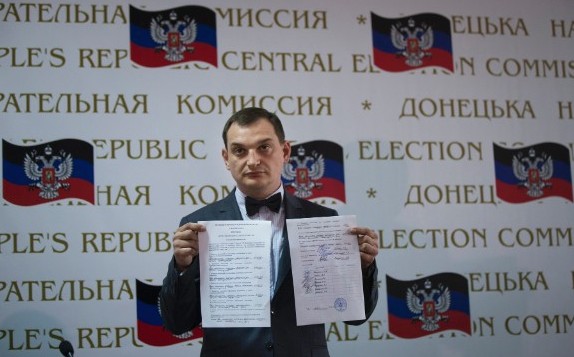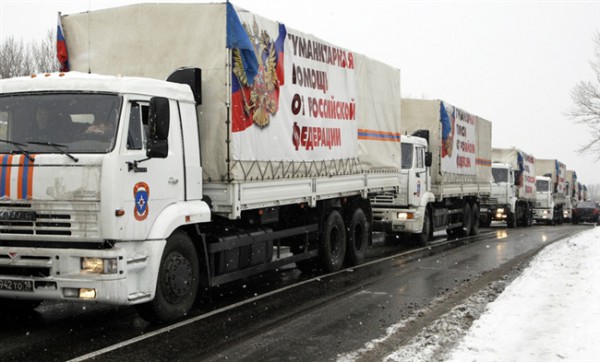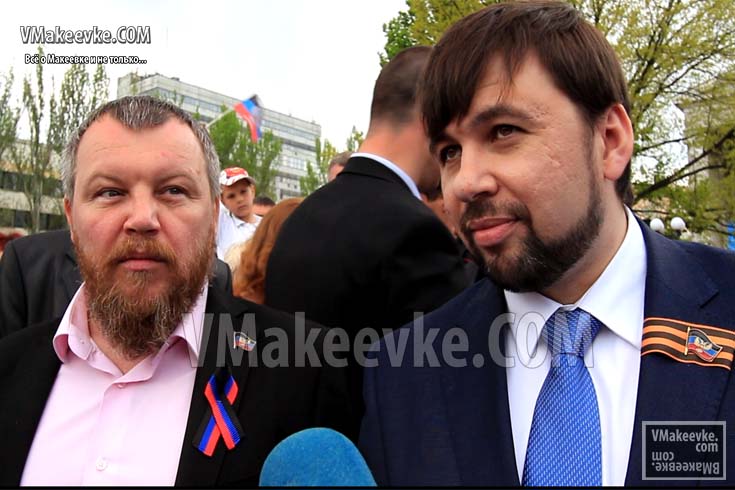Oleksandr Mikhelson for UP
http://img.pravda.com/images/doc/5/b/5b6a9f0-625-abhaziya.jpg
The early presidential elections in the unacknowledged republic of Abkhazia are appointed for Ukraine’s Independence Day on August 24th. A simple coincidence. But it is far from being the only one.
Early election were held there almost ten years ago as well. They occurred because of the falsification of the scheduled elections which took place in October 2004. And what a coincidence: in Ukraine, presidential elections were underway as well during that time, the falsification of which birthed Maidan.
A decade ago the Ukrainians, busy with their own affairs, did not pay much attention to the events in Abkhazia. However now numerous political active citizens of our country see something akin to the existing Ukrainian revolutions in the Abkhaz events. An opinion is spreading that all of this might mean the attempts of the unacknowledged government structure to exit from under the wing of the Russian two-headed eagle.
In reality nothing like this is being predicted, just like nothing similar should have been expected back in 2004. Though the geopolitical ace was played widely by the conflicting camps in Abkhazia back then, and they are still playing it now.
Before 2004 independent Abkhazia had not experience changes in high government. Starting 1990, so Soviet times, the land was headed by Vladislav Ardzynba. It is curious that as opposed to the unchangeable leaders of the former Soviet republics of Central Asia, Ardzynba was a classical intellectual: the son schoolteachers, a professional historian, a world-renowned specialist in the Khett State. There are not many specialists in this topic in the world, important for the understanding of the history of Mediterranean civilisations, as it is quite poor in terms of sources.
Intelligence did not prevent Ardzynba from leading the army which, with Russia’s help in the first half of the 1990’s managed to defeat the Georgian army and provide for Abkhazia’s cessation from Georgia, an autonomous part of which Abkhazia had been before the fall of the USSR. Ardzynba became the leader of the newly-established state, out of which the victors kicked out practically all ethnic Georgians. Russia itself, we remind you, acknowledged the independence of Abkhazia only after the Russian-Georgian war of 2008.
By 2004 the 59-year-old politician suffered from an entire bouquet of chronic illnesses which tied him to the wheelchair. Early elections were inevitable.
Ardzynba decided to make the Prime Minister Raul Khadzhimba his heir. Particularly, first came the decision and later, in 2003 – the appointment of Khadzhimba to this post. This was how Ardzynba planted the seeds of conflict.
A familiar turn of events, is it not?
As opposed to his Ukrainian colleague at the time, Viktor Yanukovych, Khadzhimba started not as a criminal, but a worker of the KGB. The fact itself promised him special sympathies on part of the Kremlin. And these sympathies were shown. Russian President Vladimir Putin did not overtly show that he supported Khadzhimba, however he met with him with pointedly wide coverage of the Russian mass media, and all of these mass media emphasised the thought that Khadzhimba was “Russia’s candidate.”
Just like Yanukovych, the Kremlin-approved hair to the Abkhaz throne had competition: the Prime Minister of the republic in the end of the nineties, and head of the local fuel giant within the scope of Abkhazia by the time of the elections, Sergey Bagapsh.
This is where cardinal difference between Abkhazia and Ukraine start. Bagapsh was in no way the “Abkhazian Yushchenko.” Yes, he said a lot about fight against corruption and authoritarianism which, according to many Abkhazians, have crossed all allowable lines. However, in contrast to the Ukrainian “analogue,” there was nothing pro-western in Bagapsh’s activities.
Therein lies the key to the understanding of the events.
Any Abkhazian would tell you that after the bloody war with Georgia, Abkhazia will not be able to become “pro-western” in any way – read “anti-Russian.” Though, in reality this was not always the case. Say, in the articles of Russian Wikipedia on the history of Abkhazia, one can find statements against the Georgians that they… helped the Russians enslave freedom-loving Abkhazia back in the 19th century, during the Caucasian War! So continue talking about the “eternal friendship” between the Abkhazians and Russians against Georgia.
However there is another historical fact which proud Abkhazians do not like to acknowledge, but which essentially influences the local politics. Without Russian money – both in the form of investments and direct inflow, – today’s Abkhazia will not survive. The same way Donbas cannot survive without external input.
Overall, the moods of today all come down to the fact that Russia is a strategic and irreplaceable friend, but Abkhazia is an independent country which does not need to be part of any other state. This is how the unacknowledged republic is different, say, from South Ossetia or, what is more, Crimea.
However – another funny coincidence, – two thousand years ago the Abkhazian capital of Sukhumi was called Sebastopolis, meaning Sevastopol…
But let’s return to the present. Pro-Russian moods of the Abkhaz voters are an integral “component” of their anti-Georgian moods, however their patriotism is quite wholesome. Politicians are forced to account for both things. Besides they all know very well what has been mentioned above about the money Abkhazia is living on. Therefore the “anti-Russians” politicians are impossible in Abkhazia. But this also means that the participants of electoral battles are trying to label their opponents exactly this way.
Essentially, this is what happened to Sergey Bagapsh in 2004. Government propaganda labeled him as a Georgian agent, and, of course, an agent of the USA. This line was significantly enforced when it turned out that Bagapsh was winning over his competitor in the first round with the minimal necessary result of 50,08%, taking into account that the “official heir” Khadzhimba had 32%.
And the Russian mass media happily took up this propaganda. It came down to the fact that while in Sukhumi protests were still underway, courts were in session and forcible occupations and counterattacks of the Central Electoral Committee happened – the Russian TV channels surely declared the victory of Raul Khadzhmba which, they said, the western special services were trying to undermine.
As we can see, their current fantasy about the omnipotent Right Sector, which is commanded by the US State Department stems from quite old times and events.
Meanwhile Bagapsh, once more, was in no way pro-western or pro-Georgian: the only fact “in favor” of these statements, presented by Khadzhimba’s side at the time is that Bagapsh’s wife was an ethnic Georgian!
And, of course, there were no “Western agents” active in Abkhazia. Just like Russian agents, as well. They were talking mainly about the strive of the “oppositional” elites to control finances, and, most importantly, about the tiredness of the wide masses of how this control was conducted before.
Alas, the clashes in Sukhumi led quite swiftly to shootings and victims. But, fortunately, this seriously scared the influential clans. And the word “clan” in Abkhazia with a population of 240 thousand means not only an economical group, like in Ukraine, but an almost literal family strucutre.
As a result, in November of 2004, when the Kyivans first came out to Maidan, the Abkhazian Parliament, and, together with it, a non-Constitutional but a very influential structure – the Elder Council – deemed Bagapsh president. However the elders insistently recommended that the victor give Khadzhimba the post of Vice President or Prime Minister.
As opposed to the Abkhaz elders, Russia, afraid of its own phantoms, at first did not understand what was happening. The governor of Krasnodar Krai at the time, well-known Russian ultra-patriot Alexander Tkachev even suspended import of tangerines from Abkhazia to the Russian Federation. A number of limiting measures in regard to Abkhaz citizens was declared as well – for example, non-payment of Russian pensions, which 25 thousand Abkhazians received.
However Moscow oriented itself gradually. With its support and approval in January of 2005, re-elections happened in the republic, which predictably made Bagapsh President, and Khadzhimba – Vice President. Bagapsh put his own man as Prime Minister.
Vladislav Ardzynba, whose under-planned decision regarding Khadzhimba’s candidacy put the land on the brink of civil war, gave over power on February 12th of 2005. Five years later he died in a Moscow clinec.
But even before that, in August of 2007, “pro-Georgian” Bagapsh did everything to help Russia fight against Georgia. As it could not have been otherwise.
***
Why in this text so much is said about the events in 2004, and not 2014? Because the current events are a direct consequence and even a direct continuation of his 10-year-old history.
On May 29th, 2011 President of Abkhazia Sergey Bagapsh, a passionate smoker during almost his entire life, died of lung cancer. This also happened in one of the hospitals in Moscow, where both Russian and European doctors fought in vein for the politician’s life.
By that time Raul Khadzhimba left the post of Vice President and headed the Abkhaz opposition. But the early elections appointed after the death of Bagapsh on August 26th, 2011 left him in third place – less than 20% of the votes.
The race was won by Alexandr Ankvab. Sergey Bagapsh appointed him Prime Minister back in 2005. And in 2009 Ankvab became Vice President instead of Khadzhimba.
It would seen that in 2011 Sergey Bagapsh managed to do what his former opponent Ardzynba couldn’t, however the latter prepared his heir much beforehand, and Bagapsh died suddenly.
However in 2014 Raul Khadzhimba played the card Bagapsh had once played against him. As in the years gone by monetary investments from the Russian budget into Abkhazia constituted astronomical numbers: only in 2010-2012 the officially acknowledged “free help” constituted 10 billion Russian roubles.
However there was no significant improvement of live. And lessening of corruption either.
It is under the mottos of fight against corruption that several thousand activists gathered in Sukhimi in the end of May of the current year.
Their protest ended in an occupation of the President’s residence. Ankvab himself hid at a Russian military base. But this does not mean in any way that his opponents also oppose Russia.
On June 1st Ankvab renounced power. At that moment the majority of Parliament members and leaders of law enforcement structure were either standing against him or “being neutral,” in other words, they were also against the President. Now there will be new elections in the republic.
But the pro-Russian orientation of Abkhazia will not change.
Thus, unfortunately, the methods of distribution of Russian aid will not change either, which keeps this unacknowledged republic goong, close to our southeast.
So far only geographically close.
Oleksandr Mikhelson
Source: Pravda
Translated by Mariya Shcherbinina




